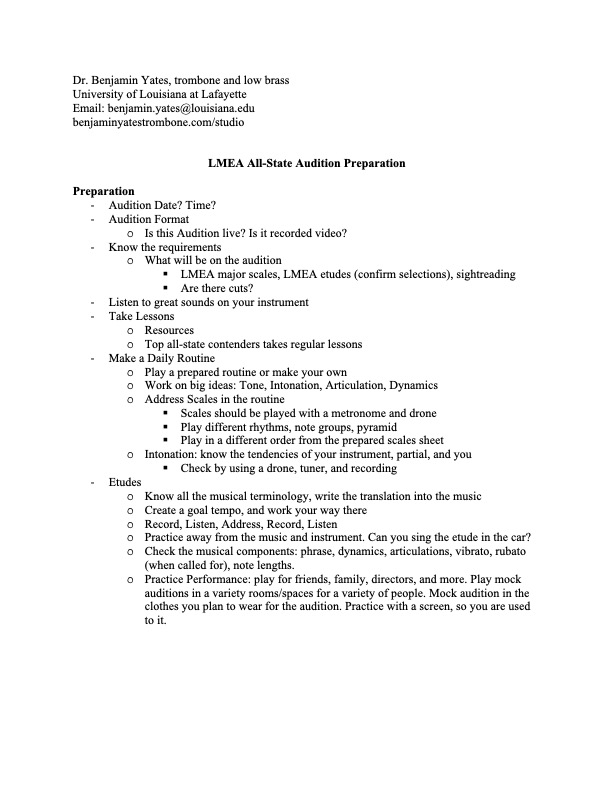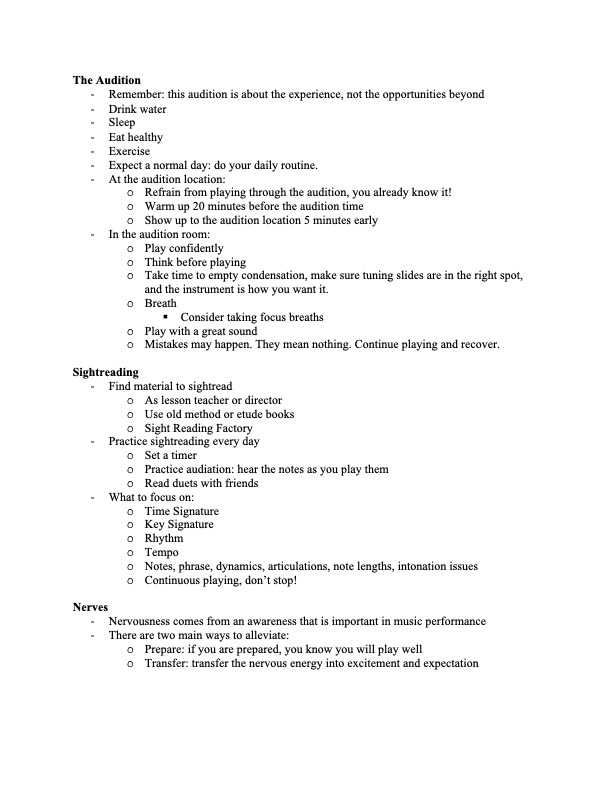Practicing Smarter

The following tips should help students practice efficiently and quickly. Often, I give students a minimum amount of time they should practice each week. For music majors, this is typically 4 hours a day. However, this time means nothing is the practice is mindless. The following tips should help keep a focused approach to practice.
Practicing can be one of the most personal things we experience as an instrumentalist. This requirement of what we do includes hours of spending time alone with our music and instrument trying to figure out how to make what we are doing better. My job as a teacher is to provide you with goals and methods for practicing smarter and faster- The accomplishments you make as a student are simply your accomplishments!
We all get worked into careless routine- realize potential by actively working towards goals.
Practice with goals:
- See “Goals” organizer below
- What do you want to accomplish?
- Pick something you can accomplish
- Select a timeframe of accomplishment
- Before practicing, be sure to have a plan on HOW to accomplish the goal
- Notes about goals
- Goals must be part of a greater plan for the day/wee/month/rotation
- Write down goals
- Log notes before the session/during/after
- Stay positive
- Being negative in goals will wear you down (“I have to learn this music!”)
- If a goal isn’t accomplished, look at it rationally: Why? What was the misstep? How can I do better tomorrow?
- When practicing, try to remove feelings or emotion about yourself, and instead, try to be more like a teacher- rather than telling yourself something sounds like crap, tell yourself that isn’t the way you intend to play that, and come up with ways of working through it.
Practice in Blocks of Time:
- See “Daily Practice Blocks” form below
- Blocks helps you organize time, needs of the instrument, and keeps you on track
- Organization is key the further you go in this:
- Example: Next fall I have 3 recital tours, 2 concerto performances, 5 orchestral performances, 1 band performance, 1 jazz performance, several chamber ensemble performances, and some things I don’t know about yet. I’ve spent the last 3 weeks working out plans for all this music and starting to work on it, but my plan includes times for all of these things to come together.
Other Tools:
- Metronome
- Tuner
- Record
- Use a mirror
- Video Record
- Envision the performance for excitement
Time, Tune, Tone
- In this order, these are the biggest things to focus on in practice

Note Taking
Take notes
- Before Practice Session
- what do you want to practice?
- how to you intend to practice it?
- what tools or techniques will you use?
- During the practice session
- if it is time to move on, keep notes on how far you got, what problems still are, etc.
- what needs to be added to the daily routine to assist practice?
- After the practice session
- what needs to be practiced in the next session
- reflect on what went well. what didn't. and how you can make the next session more productive.
- Prepare thoughts for the next session so you can maintain a focused approach.

LMEA All-State Audition Materials
The following videos and commentary are the culmination of a years long project. When giving lessons, clinics, and information to high school students about the LMEA All-State audition process, I’ve found that there is a substantial amount of confusion about how the audition etudes and scales should be performed. There are many resources for examples of the VoxmanSelected Studies, but I find many students become confused and frustrated on how to execute many of the etudes. Additionally, the stratification of knowledgeable information about a specific instrument and its etudes make is difficult for many students to learn about their audition pieces. My hope is that these eight videos are just a start to providing information at an accessible level to all students around the state, providing everyone a better opportunity to learn and have a good audition process. The University of Louisiana at Lafayette plans to follow up this set of tenor trombone etude preparation videos with videos for the bass trombone, euphonium, and tuba audition etudes. Please check back soon!
Himie Voxman
Many students do not know the background of Selected Studiesby Himie Voxman. Why these studies became standard All-State audition works throughout much of the United States and how the method came to be is an important history.
Voxman was born in Centerville, IA (not far from my hometown) and studied at the University of Iowa. He later was the director of the UI School of Music from 1954-1980, leading not only the financial push, but the research and educational push to make the University of Iowa a respected and known institution for music and music education in the United States. The University of Iowa has named two music buildings in Voxman’s honor. The original Voxman School of Music building was completed in 1971. The facility was flooded in 2008 and rebuilt on higher ground in 2016.
Himie Voxman was born in 1912 to immigrant parents from the Ukraine. The Selected Studiesbook was first published in 1954 through the Rubank Educational Library. In early 1951, Voxman was provided a modest stipend from the University of Iowa to travel Europe in search of unpublished music that could be arranged for a series of method books for band instruments. Selected Studiesis a representation of some of the work Voxman rediscovered. Some of his research led to the “rediscovery” or “American discovery” of European methods not known at the time, included many works by Blazhevich and Boismortier. There is some debate over the ethical use of many manuscripts Voxman found and republished.
Many students ask me why they are expected to learn outdated music. I don’t really have a solid answer. For the most part, these resources came of age as school music and specifically band programs developed. Once an audition work is in place, it is difficult to replace or update it, leaving the older music in place.
LMEA All-State Audition Preparation


Some Tips for preparing the LMEA All-State audition process
LMEA All-State Tenor Trombone Etude Videos
LMEA ALL-State Trombone Audition Etudes
Set IV- Voxman Pg. 25, 26
LMEA ALL-State Trombone Audition Etudes
Set I- Voxman Pg. 22, 28
LMEA ALL-State Trombone Audition Etudes
Set II- Voxman Pg. 11, 13
LMEA ALL-State Trombone Audition Etudes
Set III- Voxman Pg. 7, 19
LMEA All-State Bass Trombone Etude Videos
LMEA ALL-State Bass Trombone Audition Etudes
Set I- Grigoriev Page 16 f-sharp minor, Page 2 C Major
LMEA ALL-State Bass Trombone Audition Etudes
Set II- Grigoriev Page 5 d minor, Page 25 G-flat Major
LMEA ALL-State Bass Trombone Audition Etudes
Set III- Grigoriev Page 12 d minor, Page 21 D-flat Major
LMEA ALL-State Bass Trombone Audition Etudes
Set IV- Grigoriev Page 14 c minor, Page 19 E Major